新技能英语-高级教程教案-unit1
- 格式:doc
- 大小:157.50 KB
- 文档页数:18
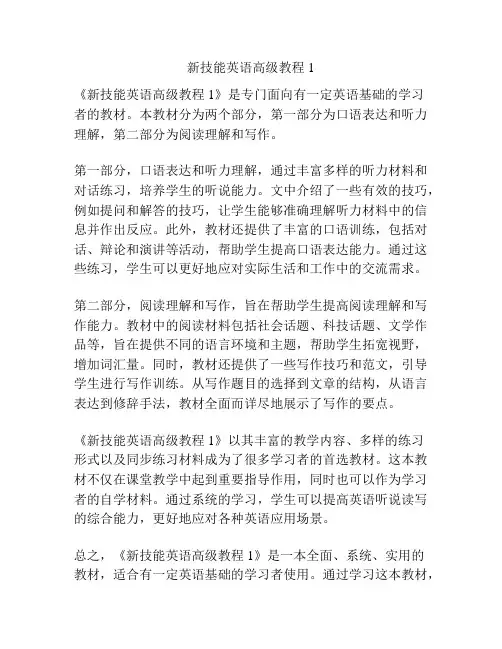
新技能英语高级教程1
《新技能英语高级教程1》是专门面向有一定英语基础的学习
者的教材。
本教材分为两个部分,第一部分为口语表达和听力理解,第二部分为阅读理解和写作。
第一部分,口语表达和听力理解,通过丰富多样的听力材料和对话练习,培养学生的听说能力。
文中介绍了一些有效的技巧,例如提问和解答的技巧,让学生能够准确理解听力材料中的信息并作出反应。
此外,教材还提供了丰富的口语训练,包括对话、辩论和演讲等活动,帮助学生提高口语表达能力。
通过这些练习,学生可以更好地应对实际生活和工作中的交流需求。
第二部分,阅读理解和写作,旨在帮助学生提高阅读理解和写作能力。
教材中的阅读材料包括社会话题、科技话题、文学作品等,旨在提供不同的语言环境和主题,帮助学生拓宽视野,增加词汇量。
同时,教材还提供了一些写作技巧和范文,引导学生进行写作训练。
从写作题目的选择到文章的结构,从语言表达到修辞手法,教材全面而详尽地展示了写作的要点。
《新技能英语高级教程1》以其丰富的教学内容、多样的练习
形式以及同步练习材料成为了很多学习者的首选教材。
这本教材不仅在课堂教学中起到重要指导作用,同时也可以作为学习者的自学材料。
通过系统的学习,学生可以提高英语听说读写的综合能力,更好地应对各种英语应用场景。
总之,《新技能英语高级教程1》是一本全面、系统、实用的
教材,适合有一定英语基础的学习者使用。
通过学习这本教材,
学生可以提高自己的口语表达和听力理解能力,同时也能够提升阅读理解和写作能力。
这本教材的使用将会对学习者的英语水平和应用能力有着积极的影响。
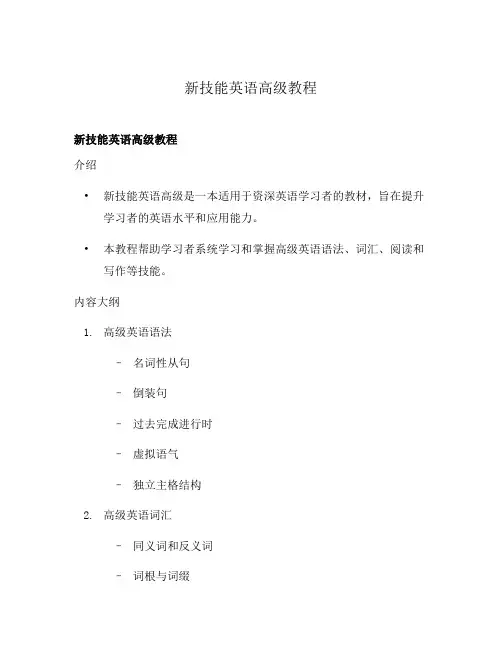
新技能英语高级教程
新技能英语高级教程
介绍
•新技能英语高级是一本适用于资深英语学习者的教材,旨在提升学习者的英语水平和应用能力。
•本教程帮助学习者系统学习和掌握高级英语语法、词汇、阅读和写作等技能。
内容大纲
1.高级英语语法
–名词性从句
–倒装句
–过去完成进行时
–虚拟语气
–独立主格结构
2.高级英语词汇
–同义词和反义词
–词根与词缀
–习语和俚语
–词汇联想法
–动词词组搭配
3.高级英语阅读
–阅读理解技巧
–阅读不同类型文章
–提高阅读速度和理解能力4.高级英语写作
–论证和逻辑推理
–高级文章结构
–表达观点和观点转换
–提高写作流畅度和准确性5.高级口语技巧
–辩论和演讲技巧
–利用幽默和修辞手法
–灵活运用高级口语表达方式
–增强说话自信和流利度
学习方法
•每个章节的学习建议和注意事项
•多做练习题和模拟考试
•主动参与英语沙龙和交流活动
•创造实际应用场景,提升语言运用能力
结语
•本教程旨在帮助学习者提高英语水平,在实际应用中灵活运用所学技能。
•学习过程中要保持积极态度和坚持性,不断练习和总结经验。
•祝愿每位学习者在新技能英语高级的学习过程中取得成功!。
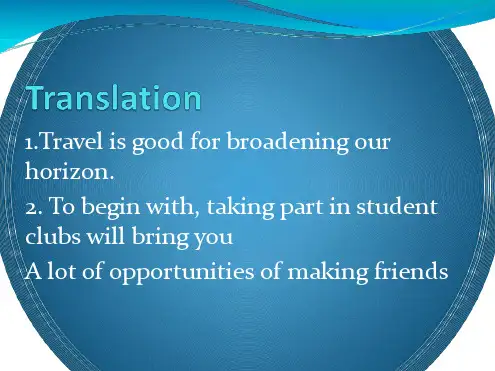
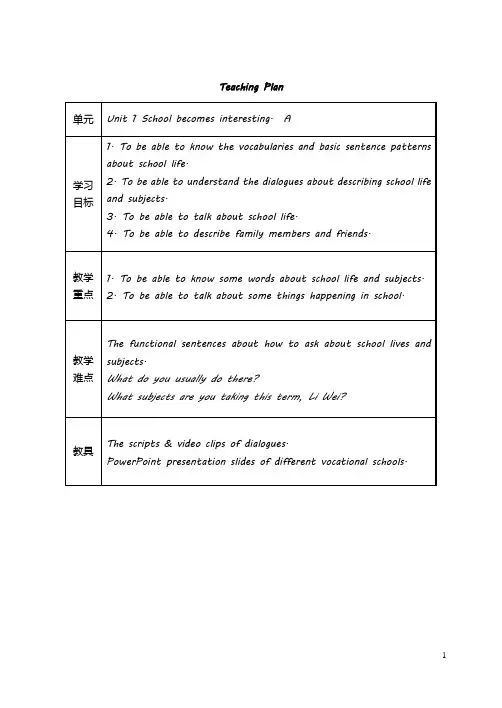
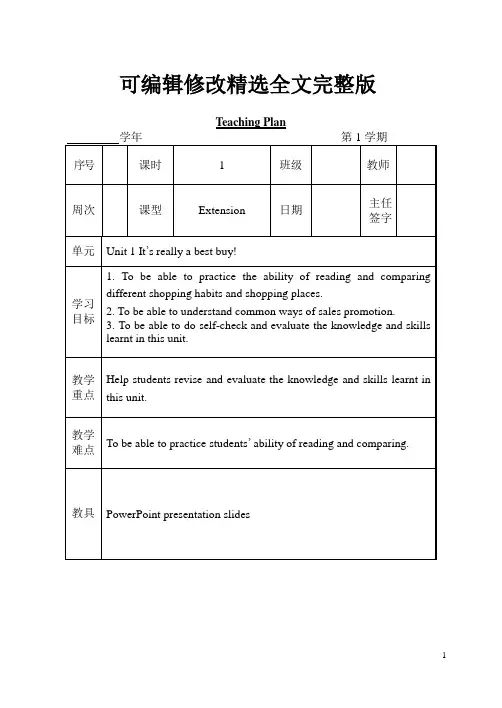
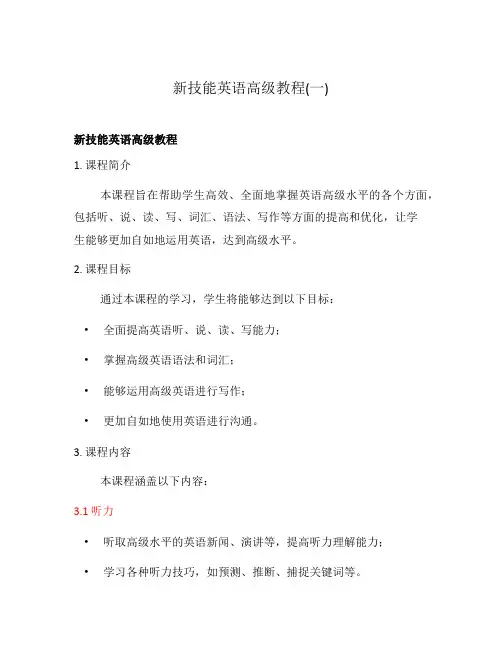
新技能英语高级教程(一)新技能英语高级教程1. 课程简介本课程旨在帮助学生高效、全面地掌握英语高级水平的各个方面,包括听、说、读、写、词汇、语法、写作等方面的提高和优化,让学生能够更加自如地运用英语,达到高级水平。
2. 课程目标通过本课程的学习,学生将能够达到以下目标:•全面提高英语听、说、读、写能力;•掌握高级英语语法和词汇;•能够运用高级英语进行写作;•更加自如地使用英语进行沟通。
3. 课程内容本课程涵盖以下内容:3.1 听力•听取高级水平的英语新闻、演讲等,提高听力理解能力;•学习各种听力技巧,如预测、推断、捕捉关键词等。
3.2 说话•学习高级英语口语和发音;•练习高级英语对话,提高口语表达能力;•学习各种口语技巧,如口语连读、口语节奏等。
3.3 阅读•朗读高级英语文章,提高阅读能力;•学习高级英语词汇和语法,提高阅读理解能力;•分析高级英语文章,提高阅读技巧。
3.4 写作•学习高级英语写作技巧和写作范例;•练习高级英语写作,包括短文、议论文、演讲稿等;•提高写作表达和语言组织能力。
3.5 语法•学习高级英语语法,如时态、语气、虚拟语气等;•练习高级英语语法,加深语法理解和掌握程度。
3.6 词汇•学习高级英语词汇,如同义词、反义词、词根词缀等;•练习高级英语词汇,增加词汇量和掌握程度。
4. 学习方法•每日坚持学习,不断复习;•听、说、读、写并重,注重实践;•多听、多说、多读、多写,提高语感和语音语调;•注意语言学习的机会,尝试和母语为英语的人进行交流。
5. 学习资源•本课程提供全面的学习资料,包括英语新闻、英语文章、视频和音频等;•可以参考其他英语学习资料,如英语学习网站、词典和外教等;•听力和口语训练可通过听力训练软件和线上学习班获得。
6. 学习评估•学生定期进行测试和评估;•定期进行听、说、读、写的模拟练习;•课程结束时进行综合测试和评估。
7. 总结本课程旨在帮助学生整体地提高英语水平和实践能力。
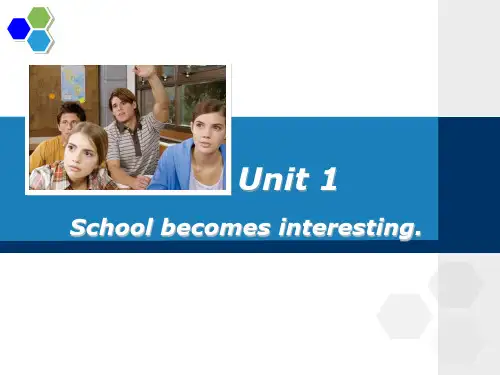
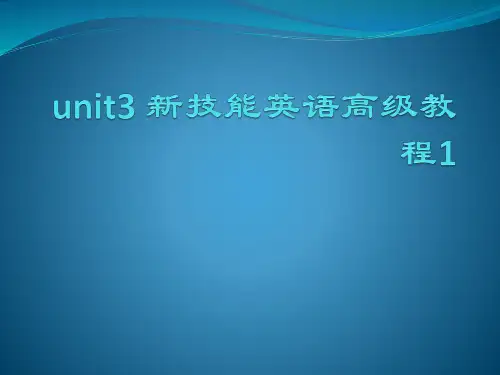
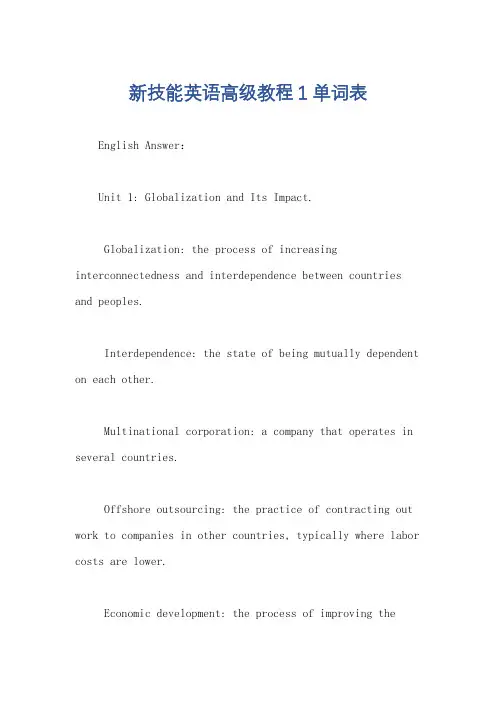
新技能英语高级教程1单词表English Answer:Unit 1: Globalization and Its Impact.Globalization: the process of increasing interconnectedness and interdependence between countries and peoples.Interdependence: the state of being mutually dependent on each other.Multinational corporation: a company that operates in several countries.Offshore outsourcing: the practice of contracting out work to companies in other countries, typically where labor costs are lower.Economic development: the process of improving theeconomic well-being of a country or region.Human development: the process of expanding human capabilities and choices.Sustainable development: development that meets the needs of the present without compromising the ability of future generations to meet their own needs.Unit 2: Technological Advancements.Artificial intelligence (AI): the ability of computers to perform tasks that normally require human intelligence.Blockchain: a distributed database that is used to maintain a continuously growing list of records, called blocks.Cloud computing: the delivery of computing services over the internet.E-commerce: the buying and selling of goods orservices over the internet.Internet of Things (IoT): the network of physical devices that are connected to the internet.Machine learning: the ability of computers to learn without being explicitly programmed.Virtual reality (VR): the use of computer technology to create a simulated environment that can be experienced by the user.Unit 3: Environmental Challenges.Climate change: the long-term alteration of temperature and typical weather patterns in a place.Deforestation: the clearing of forests.Desertification: the process by which land becomes desert.Environmental degradation: the damage or destruction of the natural environment.Extinction: the dying out of a species.Global warming: the gradual increase in the average temperature of the Earth's atmosphere.Pollution: the contamination of the natural environment with harmful substances.Unit 4: Social and Cultural Changes.Cultural diversity: the variety of cultural practices and beliefs that exist in a society.Cultural identity: the sense of belonging to a particular culture.Cultural relativism: the belief that all cultures are valid and should be respected.Globalization of culture: the spread of cultural practices and beliefs across national borders.Intercultural communication: communication between people from different cultural backgrounds.Social change: the transformation of socialinstitutions and practices over time.Social inequality: the unequal distribution of resources and opportunities in a society.Unit 5: Global Health and Well-being.Access to healthcare: the ability to obtain healthcare services when needed.Communicable diseases: diseases that can be transmitted from one person to another.Global health: the health of people around the world.Health disparities: the differences in health outcomes between different groups of people.Non-communicable diseases: diseases that are not transmitted from one person to another.Public health: the science and art of preventing disease, prolonging life, and promoting health through organized efforts.Universal health coverage: the provision of health services to all people, regardless of their ability to pay.Unit 6: International Relations.Diplomacy: the conduct of international relations through negotiation and dialogue.Foreign policy: the policy of a government towards other countries.Globalization of politics: the increasinginterconnectedness and interdependence of political systems around the world.International law: the body of law that governs relations between states.International organizations: organizations that are composed of member states and that work to promote cooperation among them.National security: the protection of a country from threats to its security.War: a state of armed conflict between two or more countries.中文回答:单元 1,全球化及其影响。
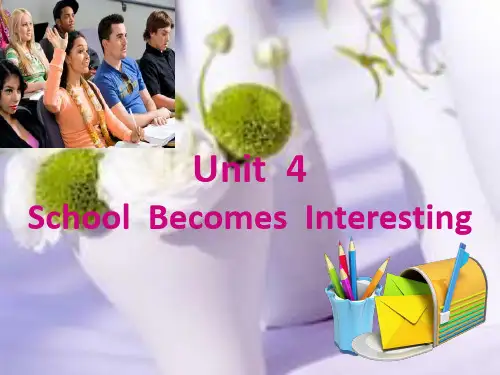
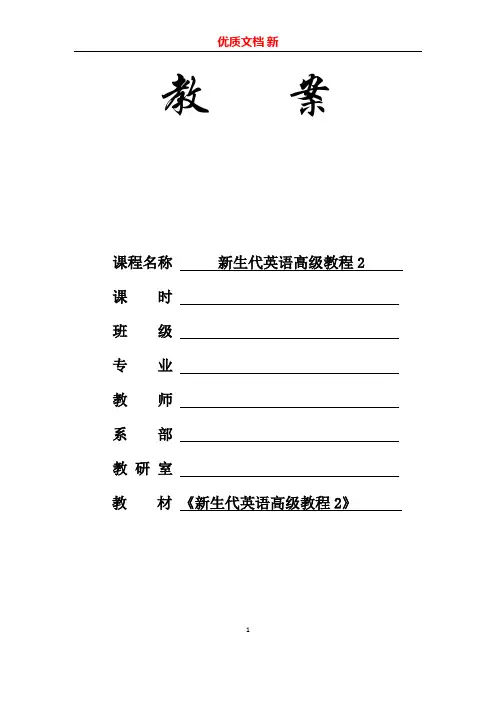
Unit 1单元试题Part A Vocabulary and grammarI. Fill in the missing words according to the sentences.1.I am studying in a v school now.2.What s_____ do you take this term? I take English, math andcomputer basics.3.In the afternoon, we do some s_____-training in differentplaces.4.What is your m_________? Mine is accounting.5.There are a lot of machines in this f________?II. Choose the proper meaning for the underlined parts.1. A secretary usually works in an office, organising files, doing reception and answering calls.A. 记录B. 整理文件C. 组织活动D. 整理办公室2. Are you good at programming? Come to our club on Monday.A. 对……适合B. 学得很好C. 对……感兴趣D. 擅长于3. There are 5 students in my dormitory and we all like it.A. 校园B. 教室C. 宿舍D. 操场4. I work very hard and I want to find a good job in the future.A. 在将来B. 在明天C. 在过去D. 现在5. Tom studies for over two hours every evening, so he has no time to watch TV.A. 大约B. 关于C. 超过D. 不足6. Three new tour guides are wanted in this travel agency.A. 导购B. 导游C. 接待员D. 秘书7. Sometimes we have classes in factories.A. 上班B. 实习C. 放学D. 上课8. Computer basics is an important subject for us students nowadays.A. 计算机基础B. 计算机系统C . 计算机运用 D.计算机原理III. Complete the following sentences according to the Chinese given.1. We will learn _______________ (如何使用新电脑).2. Some of us work as __________________ (商店的收银员).3. I find it really easy _____________ (认识新朋友).4. We often _______ (上技能训练课) on Monday morning.5. __________ (有两节英语课) on Friday afternoon.IV. Choose the best answers.()1. What ______ you usually in your English classes? A. do; does B. does; does C. does; do D. do; do()2. Do you ________ have computer basics in the first term?A. neverB. almostC. oftenD. already()3. I want to learn __________ cars.A. how to repairB. repair how toC. how repair toD. to repair how()4. Is there any________ in your school?A. foreign teachersB. science clubC. factoriesD. dormitories()5. Some of my classmates work secretaries in companies..A. forB. toC. withD. as()6. I have to _______many subjects in my first term.A. takeB. takesC. takingD. be taken( ) 7. There _______not enough time for us to prepare.A. hasB. haveC. isD. are( ) 8. _______ is a new shopping center in the city.A. ThatB. ThereC. HereD. WhereV. Fill in the blanks with the proper forms of the words given.1. Are you good at __________ (program)? Come and join us!2. He is very busy and ______ (have) no time to play football.3. I want to learn some _________ (secretary) skills in our school.4. Which subject do you like_______ (good)?5. The cooks in the restaurant show us how to ______ (prepare) food.Part B Language practiceⅥ. 你是一家有资质的企业培训机构的客户经理,请对前来进行培训咨询的三名客户Zhang Yong , Lisa, Max的培训需求进行分析并建议其参加适合的培训项目。
一、单元整体解读及分析1. Background informationE-Commerce: The beginnings of e-commerce can be traced back to the 1960s, when businesses started using Electronic Data Interchange (EDI) to share business documents with other companies. In 1979, the American National Standards Institute developed ASC X12 as a universal standard for businesses to share documents through electronic networks. After the number of individual users sharing electronic documents with each other grew in the 1980s, in the 1990s the rise of eBay and Amazon revolutionized the e-commerce industry. Consumers can now purchase endless amounts of items online, both from typical brick and mortar stores with e-commerce capabilities and one another.2. Word attack1) registration n. the act of entering on an official list. 注册e.g. Kindergarten registration begins today.2) major n. the main subject studied by a college or university student. 主修科目e.g. He chose history as his major and French as his minor majors.What was your major in college?3) fill in supply with information on a specific topic. 填写e.g. The participants were then asked to fill in evaluation forms giving their assessment of the workshop.4) admission notice 录取通知书e.g. With your college admission notice, you can buy train tickets at half-price.3. Useful expressionsAsk for and Offer Help1) What can I do for you?2) May I have your…please?3) I’m here for…4) Excuse me, but could you tell me the steps for registration?5) Is there anything I can do for you?6) Would you mind passing me a piece of paper to write my suggestion on?7) Will you lend me a hand?4. Extensive reading materialsCollege majors:/5. Useful clipsGuide for freshmen1. Background informationCan I change my major?Yes. In fact, studies find that most students change majors at least once and many switch several times. So it might not be a good idea to pick a college only for its program in one major. Instead, consider colleges that offer a range of options that interest you. That way, changing majors won't necessarily require changing colleges, too.If I want to become a doctor or lawyer, do I have to major in premed or prelaw? It might surprise you to know that majoring in premed or prelaw is impossible at almost every college. Premed and prelaw, are not majors. They are special college programs that guide students through the process of preparing for and applying to professional schools, such as medical or law school.So, if you choose to participate in one of these programs, you'll still have to declare a major. Many premed students, for example, major in biology or chemistry. However, as long as you fulfill the admission requirements of the professional school, you can major in just about anything. In fact, professional schools often look for well-rounded students with diverse backgrounds.See the full list at2. Word attack (教师可补充词语的其他常用意思,辅以例句。
)1) senior n. a student in the final year of high school or college. 最高年级的学生e.g. I'm a senior undergraduate student at the University of Vermont.2) hesitate v. to be unwilling to do something because of doubt or uncertain. 犹豫e.g. He hesitated about accepting the job.Don't hesitate to call if there is a problem.3) be supposed to be required to do something because of the position one is in or an agreement one has made. 应当做e.g. I was supposed to be meeting her at the airport, but I forgot.4) depend on to need (someone or something) for support, help, etc.依赖;依靠e.g. He no longer depends on his parents for money.They depend heavily on her income to pay the bills.5)curious adj. if you are curious about something, you are interested in it and want to know more about it. 好奇的e.g. Steve was intensely curious about the world I came from.3. Useful expressionsAsk for opinions1) Do you agree…..?.2) What are your comments/idea about ...3) What do you think about...4) How do you see ...5) What do you think of/about...6) How do you think…7) Is this all right with you?8) How do you feel about that?4. Extensive readingThe College Board:1. Background informationTips for how to make the transition to college.Take control of your own education: think of yourself as a scholar.Get to know your professors; they are your single greatest resource.Be assertive. Create your own support systems, and seek help when you realize you may need it.Take advantage of the library; go to a workshop, work with a tutor.Take control of your time. Plan ahead to satisfy academic obligations and make room for everything else.Stretch yourself: enroll in at least one course that really challenges you.Make thoughtful decisions: don't take a course just to satisfy a requirement.Think beyond the moment: set goals for the semester, the year, your college career. 2. Word attack1) independence n. freedom from outside control or support. 独立性;自主性e.g. He has shown a fierce independence of spirit.2) freedom n. the condition of being free. (行动的)自由e.g. He thinks children these days have too much freedom.3) privacy n.the state of being away from other people. 隐私e.g. It’s the most fantastic moment when I’m with you at this restaurant.4) belonging n. items that belong to someone and that are small enough to be carried.行李e.g. Be sure to take your personal belongings with you when you get off the bus.5) permission n. the right or ability to do something that is given by someone who has the power to decide if it will be allowed or permitted. 允许e.g. The teacher gave me her permission to go home early.6) frankly adj. in an honest and direct way. 真诚地;坦白地e.g. You can speak frankly to us.4. Extensive reading1) The most amazing college libraries in America.Cook Legal Research Library – University of MichiganThe Cook Legal Research Library is magnificent and grand, having spires, stained glass windows, and metal works. The metal work was done by Samuel Yellin, being the best of his time. It was originally built in 1931 to hold around 350,000 volumes and then in the 1950’s there were four floors added to the stacks. There is also the Reading Room and Study Group Rooms here, which can seat hundreds of students. This library not only has the World’s best collections of research material, but also houses Cook’s Library from his Manhattan townhouse.William Oxley Thompson Memorial Library – The Ohio State UniversityThe William Oxley Thompson library is the central library at the Ohio StateUniversity and was built in 1912; having a significant multi-year renovation took place starting July 2006 and reopened August 2009. The building’s architectural style is Neo-Classical, Beaux-Arts.It provides a variety of study places, an extensive collection, and research along with faculty and staff to help. Some of the subject libraries are social science and humanities, including reference, special collections, rare books, manuscripts, university archives, journals, general interest periodicals. There are also departmental subject libraries in literature, regional foreign language, linguistics, philosophy, religion, theater, anthropology, history, sociology, and political science.Linderman Library – Lehigh UniversityThe Historic Linderman Library, which opened in 1878, was added to in 1929 and has seen major renovation since then. The Victorian Rotunda, which was from 1878, and the Grand Reading Room, from 1929, was left in all their magnificence, during the major renovation. The Linderman Library houses a rare book collection of over 40,000 books that includes Darwin’s Origins of Species and James John Audubon’s four volume elephant folio edition of The Birds of America. There is also some first editions of English and American literature, from the 17th to 19th centuries. It also has a collection of over 15,000 photo images. Some of the new features of the libraries include four seminar rooms, quiet study space, five group studies, care and is wireless.See more at1. Information backgroundDate format in UK vs USCalendar dates can be written in a wide variety of ways in English, and often depend on formal or informal writing, personal style and whether you are writing British or American English. Whatever the format, in British English, dates are usually written in the order day – month – year, while in American English they are written month –day – year.2. Word Attack1) nationality n. the fact or status of being a member or citizen of a particular nation 国籍e.g. He has held French nationality for the past 20 years.2) gender n. the behavioral, cultural, or psychological traits typically associated with one sex. 性别e.g. Please state your name, birth date, and gender.3) occupation n. the work that a person does : a person's job or profession. 职业e.g. “What's your occupation?” “I'm a stay-at-home mom.”4) signature n. a person's name written in that person's handwriting. 签名e.g. There is a place for your signature at the bottom of the form.3. Extensive reading materialsHow to Complete the IELTS Application Form: nt/How_to_Complete_App_Form_270110.pdf1. Background informationTips for Choosing Student Clubs and OrganizationsFreshmen play a big role in the life of college organizations. You comprise the new generation of recruits, the ones that will potentially take on the responsibilities that the seniors and juniors will leave behind. Freshman recruitment is the lifeblood of college organizations. The more recruits they have among the freshmen, the longer the club can exist.•Choose One or Two Potential Clubs to JoinNarrow down your options to five or less and then choose one that you intend to join, and another that you could join if you have extra time to spare. Better yet, join one club and wait a year befor e joining another. Because you’re still adjusting to college life, you may have less time to spare for extracurricular activities than you think. If you join too many, you may have to give up your weekends or shave a few hours off your study time to attend meetings. You’ll burn yourself out faster if you have too much on your plate on your first year. •Consider Your Skills and InterestsSkill-based clubs like the music or drama club may require an audition. Many college clubs related with the performing arts take their craft seriously. After all, if your major is related in any way to music or theater, being in this group can get you started in your chosen career. Plus, joining and being an active memberwould look great on your resume. Your future employers would always look at your list of extracurricular out of genuine curiosity and because they want to know how well-rounded you are. Joining clubs can be great for student athletes hoping to go pro someday. You can practice your skills off-season and you have a better chance of being scouted because of the exposure that the practice games afford.2. Word attack1) oral adj. spoken rather than written. 口述的e.g. As part of her oral examination, she had to recite the names of all the presidents.2) relevant adj. relating to a subject in an appropriate way. 相关的e.g. What does "relevant experience" mean on a resume?.3.Extensive reading materialsTop 15 most beautiful campuses in the World.1. Word attack1) salon n. a business that gives customers beauty treatments (such as haircuts). 沙龙e.g. I went to a hair salon in London the other day..2) massage n. the action of rubbing or pressing someone's body in a way that helps muscles to relax or reduces pain in muscles and joints. 按摩e.g. She gave him a neck massage3) atmosphere n. a surrounding influence or environment. 氛围;气氛e.g. And I see a big difference between the atmosphere here and the atmosphere in Oakland.4) gym n.sports and exercise taught as a subject in school. 健身房;体育馆e.g. He works out at the gym.eful clipsChinese Americans living in Beijing_XNTQ2NzA0NjQw.html。